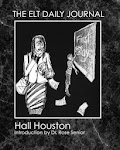In this post, I'd like to share with you some of my favorite teacher's resource books. Over the years I've worked with a large number of these books. They've been a source of inspiration and showed me new ways to help students learn English. I'd like to mention four of them and describe a sample activity from each title (along with a reflection on how it went over).
1. TEACHING UNPLUGGED BY LUKE MEDDINGS AND SCOTT THORNBURY (DELTA)
This title covers a topic that has created a lot of discussion in the blogosphere, that is Dogme or Teaching Unplugged. Karenne Sylvester has been running
a Dogme challenge for several weeks now, Jason Renshaw has blogged numerous times about
teaching unplugged and emergent language teaching, and Jeremy Harmer issued
a strong critique that garnered over 200 comments.
I first learned about Dogme from an Thornbury article in It's Magazine about 10 years ago. I was highly interested in the ideas behind it, although I was unsure about how to put them into practice. This book explains the principles behind teaching unplugged, as well as providing a diverse selection of activities. I've used several activities from this book and have been very impressed with the results.
One activity I tried:I was on the topic of films with my university students, and I wanted to get them to discuss the recent movie, Monga, a Taiwanese film that was very popular that year. Here's the movie poster I started off with:

(By the way, that's NOT the cover to a resource book.)
I used the activity "Good Things, Bad Things", which produces a debate first through writing, then speaking. It was quite a powerful lesson. I could really feel that the students were all eager to talk about this film and express their opinions. Some students felt it was a cool movie, others thought it was too violent. Overall there was a strong feeling of engagement with the subject.
2. DRAMA AND IMPROVISATION BY KEN WILSON (OXFORD)
Although certainly not the first book of drama exercises for a language teaching context, this Oxford University Press Resource Book for Teachers has a lot going for it. Fun, clever activities with clear explanations and loads of supportive comments and follow-ups. There is always a laugh riot when I use these in my classes. As Ken Wilson puts it, these activities "are for teachers who want to enliven their classes and refresh students who may be tired or subdued by they way they are asked to learn."
One activity I tried: I used the "Foreign Expert" activity with my advanced speaking and listening class earlier this month. In this activity, students work in pairs, one as an expert on a subject of their own choice and one as an interpreter. The catch: they make up a language that they translate in and out of English. My students were already laughing when I was explaining the activity. The laughter increased exponentially, as it became clear that two students were quite good at uttering gibberish that sounded like a real language!
3 HUMANISING YOUR COURSEBOOK BY MARIO RINVOLUCRI (DELTA)
Mario Rinvolucri has written (and co-written) an amazing number of resource books for teachers. Humanising Your Coursebook is the one that I use the most. It's kind of a Rinvolucri's greatest hits, suggesting a number of ways to adapt and alter a coursebook to give students more opportunities to practice.
One activity I tried: "Text All Over The Place" calls for parts of a dialogue to be printed on slips, cut up and placed over every surface of the classroom including desks, floors, walls, ceilings, even the teacher's back. As students arrive, they copy down the bits of language then do their best to put them back into order. A thought-provoking note from Mario at the end of the activity:
Is your class unruly? Don't you dare try this with them? If they are unruly, maybe it is because they hate sitting still. This exercise gets them moving.
I used this activity to add a spark to a conversation class I was teaching at a university in rural Taiwan. I remember it took over an hour to get all the little bits of paper around the classroom. It was worth it to see the look of surprise on the students' faces.
4. ZERO PREP BY LAURIE POLLARD AND NATALIE HESS (ALTA)
I've read several books by Hess and Pollard, and found them to be extremely helpful. As the title indicates, this book gives the reader a wide range of activities that require a minimum of preparation. Similar to Humanising Your Coursebook, this title covers all four skills, followed by sections for grammar (structure) and vocabulary. This book contains a lot of fresh, intriguing activities. It always reminds me that simple is best.
One activity I tried: I used "Role-Plays" with a group of university students I taught in Hong Kong. This activity asks students to brainstorm some potentially useful utterances before breaking into a role play in front of the class. The energy level of the class picked up as students got into their roles.
I'd like to hear about what resource books you've been using. Any titles you would recommend?













